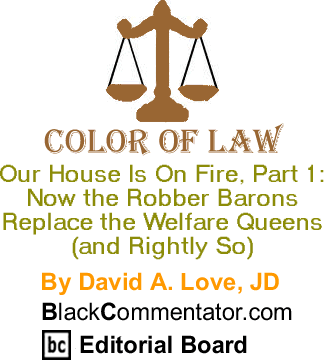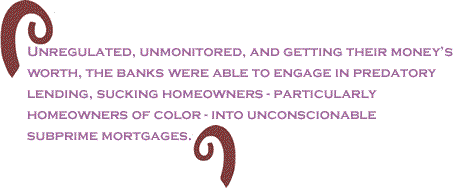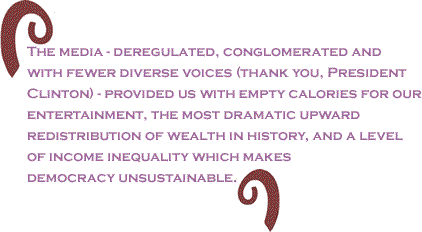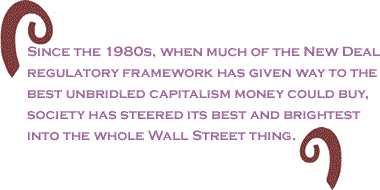
|
|||||||||||||||||||||||

|
|

Custom Search
|
|
 |
|
| The following is the first part of an ongoing Color of Law series. Gordon Gecko had a long run of it, but now the party is over. I’m talking, of course, about the character in the film Wall Street, that conniving titan of finance who would sell his mother for a buck and a quarter, and there is scant evidence that he had not already accomplished that goal. “Greed is good,” he declared. Gecko began to have his heyday in the Reagan era. That’s when the “conventional wisdom,” fueled by greed, began to call for a supply-side economic policy in which financial benefits would be bestowed upon the wealthy and businesses in the form of tax cuts. And as the theory goes, the benefits would “trickle down” to the common folk. In reality, the result was more like “trickle on”. Another hallmark of the Reagan era, which was perfected in the Clinton and Bush years, was the deregulation of the financial markets and other industries. Over the years, these policies were bought and paid for to the tune of $5 billion in contributions, given by Wall Street to Democratic and Republican politicians alike, to keep the government out of the gambling casinos, I mean financial markets. This led to the proliferation of exotic financial instruments called derivatives, which have turned out to be a little more than a high-tech, blue chip hustle. Unregulated, unmonitored, and getting their money’s worth, the banks were able to engage in predatory lending, sucking homeowners - particularly homeowners of color - into unconscionable subprime mortgages. When applied to the environment and food and safety standards, deregulation has resulted in salmonella- and rat-infested peanuts, E-coli tainted beef and climate change. Meanwhile, as the media - deregulated, conglomerated and with fewer diverse voices (thank you, President Clinton) - provided us with empty calories for our entertainment, many of us did not realize what was taking place right under our noses: the most dramatic upward redistribution of wealth in history, and a level of income inequality which makes democracy unsustainable. The land of opportunity became the most unequal, top-heavy society in the West. Since the 1980s, when much of the New Deal regulatory framework has given way to the best unbridled capitalism money could buy, society has steered its best and brightest into the whole Wall Street thing. As the nation’s infrastructure began to crumble and its students fell behind the rest of the developed world in math and science, everyone, including yours truly in a former life, wanted a job shuffling paper and moving numbers around but not creating anything tangible, not building anything of much use to society.
With the adoration of the rich and famous, and the glorification of wealth as a virtue, came the vilification of the poor and the stigmatization of poverty. This gave birth to the concept of the welfare queen, the fictional Black woman on welfare who has six children, wears a mink coat and drives a Cadillac. The typical welfare recipient is White, but never mind. What a worthy scapegoat, no doubt created in some conservative think tank. And what better justification for taking from the poor (unworthy as they are, living off the government dole), and giving to the rich (needy as they are, and unable to live the American dream)? It was “reverse Robin Hood”, as Jesse Jackson aptly described it, which culminated in the passage of welfare reform by President Clinton and a Republican Congress. A Dickensian treatment of the poor was in full fashion. Poverty became a moral failing, an issue of genetics. “Are there no debtors’ prisons? No poor houses?” Well, given that American capitalism never was meant to employ everyone (for more information, see slavery), and given that many of the good blue collar and even white collar jobs have been sent overseas, what do you do with that surplus population, as Dickens called it? It seems no accident that the prison boom, the war on drugs, and draconian prison sentencing came at a time when there were no jobs to be found in the inner cities. The “land of the free” has the world’s largest prison population, even more than China, which is a police state and has over four times the population of the U.S. Prisons are one of America’s primary forms of social control, and there is profit in the warehousing of Black, Brown, and poor bodies. And as all of this was going on, the people at the top were having a big party at our expense. There has been very little mention of the plight of the poor, although their ranks rose under Bush. In America, over 41 million people were poor as of 2005. Further, 18 percent of children live in poverty, and 1 in 50 children is homeless. With the collapse of the financial system, how can you scapegoat the poor when everyone is either poor or has real potential to join its ranks? This time around, the anger is directed towards the real culprits: the people who, like the robber barons of old, actually stole the money and brought us to where we are today.
It is cathartic to watch the spectacle of bank executives hauled before Congress to explain themselves. What got these people in trouble was not merely their obscenely immense wealth or the manner in which they earned or stole that wealth. Rather, in the midst of all the destruction they left in their path, the broken lives and stolen futures, these individuals still wanted to be rewarded for their failure, for being the special people they think they are. With their pernicious sense of entitlement, the robber barons looked at the rest of society with contempt, as if they are superior to the regular everyday chumps at the bottom of the pyramid scheme. In a moment of clarity, everyday people have identified
the real problem - unfettered capitalism. The robber barons have
replaced the welfare queens, and so we have come full circle. This
time around, the public refused to fall for the okeedoke and allow
themselves to be Click here to read any of the commentaries in this series. BlackCommentator.com Editorial Board member David A. Love, JD is a lawyer and journalist based in Philadelphia, and a contributor to the Progressive Media Project, McClatchy-Tribune News Service, In These Times and Philadelphia Independent Media Center. He contributed to the book, States of Confinement: Policing, Detention, and Prisons (St. Martin's Press, 2000). Love is a former Amnesty International UK spokesperson, organized the first national police brutality conference as a staff member with the Center for Constitutional Rights, and served as a law clerk to two Black federal judges. His blog is davidalove.com. Click here to contact Mr. Love.
|
|
Any BlackCommentator.com article may be re-printed so long as it is re-printed in its entirety and full credit given to the author and www.BlackCommentator.com. If the re-print is on the Internet we additionally request a link back to the original piece on our Website. Your comments are always welcome. eMail re-print notice
If you send us an eMail message we may publish all or part of it, unless you tell us it is not for publication. You may also request that we withhold your name. Thank you very much for your readership. |
|
| |
|
| March
12 , 2009 Issue 315 |
|
| Executive Editor: Bill Fletcher, Jr. |
| Managing Editor: Nancy Littlefield |
| Publisher: Peter Gamble |
| Est. April 5, 2002 |
Printer Friendly Version
in resizeable plain
text format or pdf
format. |
| Frequently Asked Questions |
 |

|
 |
 |
 |
| |
| |





































